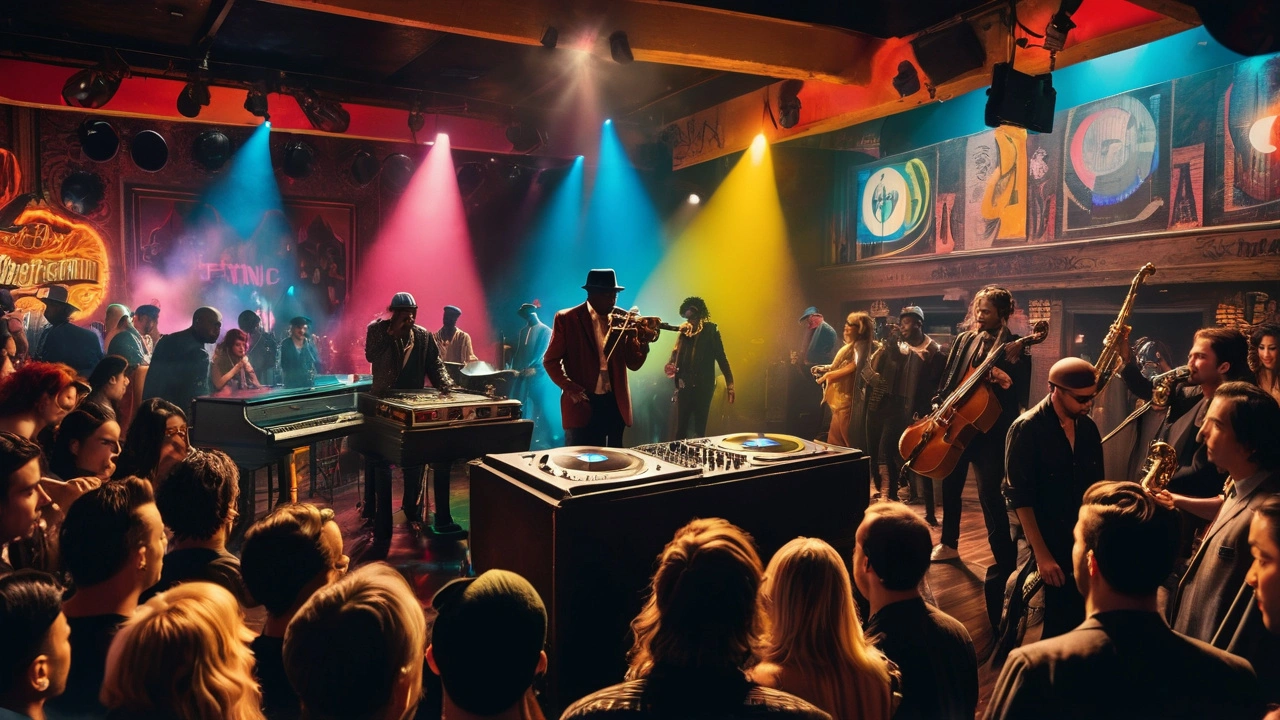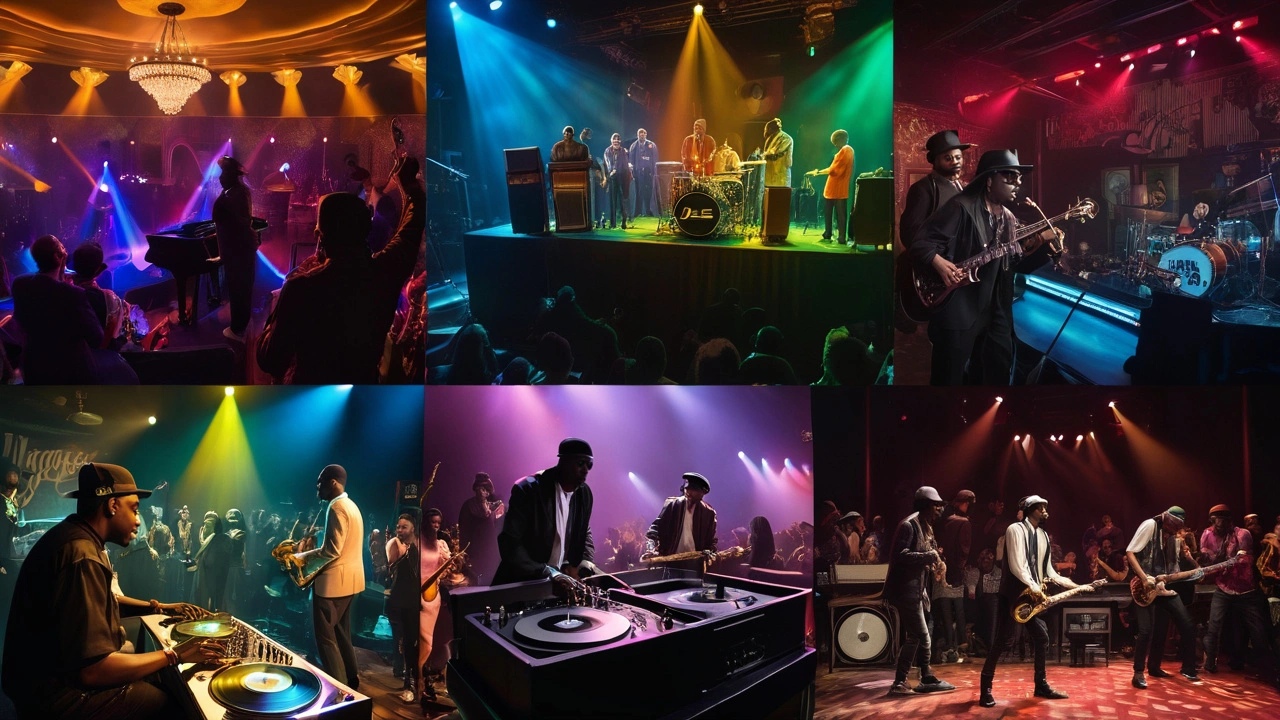Music genres paint the soundtrack of our lives, reflecting our moods, cultures, and individual tastes. Each genre has its own unique rhythm, instrumentation, and history. Diving into the world of music genres can be like embarking on an auditory adventure, taking you to different eras and corners of the world.
From the soulful echoes of blues to the energetic beats of hip-hop, each genre has carved its niche in the vast landscape of music. Whether you're a die-hard fan of rock or fascinated by electronic music's futuristic sounds, understanding the essence of each genre can enrich your listening experience and deepen your appreciation of music.
In this article, we'll journey through the origins, characteristics, and notable representatives of various music genres. We'll also introduce some lesser-known genres that might pique your interest. Along the way, you'll find tips on how to expand your musical horizons and discover new favorites.
- The Origins of Music Genres
- Popular Music Genres and Their Characteristics
- Unconventional Music Genres Worth Exploring
- How Music Genres Influence Culture
- Tips for Exploring New Music Genres
The Origins of Music Genres
The journey into the world of music genres begins with tracing their roots. Music, as human expression, dates back to prehistoric times, evidenced by ancient flutes and cave paintings depicting musical activities. The evolution of music has unfolded over thousands of years, shaped by societal changes, technological advancements, and cultural exchanges.
Ancient civilizations like Egypt, Greece, and China had distinct musical styles that have influenced modern genres. For instance, the Greeks emphasized scales and modes, laying the foundation for Western music theory. As societies evolved, so did their music, leading to the creation of genres such as classical, folk, and religious music. Each style tells a unique story of the people and cultures from which they emerged.
Classical music is often associated with composers like Bach, Mozart, and Beethoven. Its roots run deep in the annals of Western culture, predominantly flourishing between the 17th and 19th centuries. The complexity and structure of classical compositions have set the groundwork for much of today's music. Johann Sebastian Bach once said, "Music is an agreeable harmony for the honor of God and the permissible delights of the soul." This quote captures the spirit that drove early musical innovation.
In contrast, folk music is deeply intertwined with daily life and communal activities. Passed down through generations, these songs are reflections of cultural identity and historical events. They often tell stories, preserve traditions, and mark significant life events such as births, weddings, and harvests. Every culture, from the Celtic ballads of Ireland to the Sufi melodies of the Middle East, cherishes its folk music.
The early 20th century marked the birth of popular music genres as we know them today. The advent of recording technology and radio broadcasting played crucial roles in disseminating different musical styles. Jazz emerged in the southern United States, blending African rhythms with European harmony. This genre soon influenced a myriad of other genres, including blues, rock, and hip-hop.
By the mid-20th century, technological innovations like electric guitars and synthesizers led to the birth of rock and electronic music. Rock'n'roll, characterized by its strong beat and simple melodies, became the voice of a new, rebellious generation. Similarly, electronic music found its niche in the dance culture, continuously evolving with advances in technology.
Globalization has had a profound impact on the music industry. Genres have transcended geographical boundaries, allowing for a fusion of styles. For example, reggae originated in Jamaica in the late 1960s but quickly spread worldwide, influencing many other genres. Today, music streaming platforms provide an unprecedented access to diverse genres, ensuring that even the most obscure styles can find their audience.
Understanding the origins of music genres offers a deeper appreciation for the art form. Music is a living history, a mirror reflecting society’s triumphs, struggles, and evolution. Whether you favor the structured elegance of classical music, the raw emotion of the blues, or the vibrant beats of hip-hop, knowing the backstory enriches the listening experience, turning each song into a narrative of human history.
Popular Music Genres and Their Characteristics
Music genres are as diverse as our tastes, and each has its own traits that make it unique. Let's start with perhaps one of the most universally loved genres, Rock. Emerging in the 1950s, rock music is characterized by a strong beat, simple melodies, and often a focus on electric guitars. Artists like The Beatles and The Rolling Stones took rock to global heights. Whether it's the rebellious spirit of punk rock or the sprawling soundscapes of progressive rock, this genre has something for everyone.
Pop music is another dominant force in the musical world. With roots tracing back to the 1950s, pop music is designed to be accessible and catchy. It's commercial nature often features repetitive hooks, simple lyrics, and danceable rhythms. Icons like Madonna, Michael Jackson, and Taylor Swift have defined different eras of pop music with their ability to adapt and stay relevant. In today’s streaming age, pop remains at the forefront with its ability to evolve rapidly.
Next up is Hip-hop, a genre that emerged from the streets of New York City in the 1970s. With its rhythmic beat and significant use of rapping, hip-hop has grown from a cultural movement to a dominating genre. Artists like Tupac Shakur and Notorious B.I.G. exemplified its early days, while modern stars like Kendrick Lamar and Cardi B continue to push the boundaries. Hip-hop's influence extends beyond music into fashion, language, and lifestyle, showing its deep cultural impact.
Let's not forget Classical music, the cornerstone of much of Western musical tradition. Spanning from the Medieval period to the present day, classical music encompasses various styles and forms, including symphonies, operas, and chamber music. Composers like Beethoven, Mozart, and Bach are household names, their works essential study pieces for aspiring musicians. Classical music's complexity and emotional depth make it a timeless genre.
Jazz is another genre characterized by its improvisational style and complex chords. Originating in the African American communities of New Orleans in the late 19th and early 20th centuries, jazz has given us legends like Louis Armstrong and Miles Davis. Jazz's ability to adapt and incorporate elements from other musical styles has kept it continually evolving and influential.
The electronic beats of Electronic Dance Music (EDM) have taken the world by storm, particularly in the last few decades. With its high-energy, repetitive beats, and synthesized sounds, EDM is designed to get people moving. DJs like Calvin Harris, Deadmau5, and Avicii have become global superstars, often headlining major music festivals.
"Music can change the world because it can change people." ― Bono
Lastly, the soothing tones of Country music deserves a mention. Originating from the Southern United States in the 1920s, country music blends folk, blues, and ballads. With storytelling at its heart, this genre has given rise to stars like Dolly Parton, Johnny Cash, and more recently, Taylor Swift. Modern country continues to blend traditional instruments with contemporary narratives.
Other notable genres include Reggae, with its roots in Jamaican culture and its characteristic offbeat rhythms and socially conscious lyrics, and Blues, which has deeply influenced many modern music styles with its melancholic melodies and profound lyrics.

Unconventional Music Genres Worth Exploring
Diving into the world of unconventional music genres can be like finding hidden treasures in the vast sea of sounds. These genres, while not always mainstream, offer rich and diverse tones that can captivate the adventurous listener. Whether it's through unfamiliar instruments or unique rhythms, these genres break the mold and push the boundaries of musical creativity.
Klezmer music is an excellent starting point for those looking to expand their musical horizons. Originating from the Eastern European Jewish tradition, Klezmer combines soulful melodies with lively dance tunes. It features instruments like the clarinet, violin, and accordion. This genre has a rich history tied to Jewish celebrations and ceremonies. Listening to Klezmer can evoke vivid images of Eastern European festivities. Artists like the Klezmatics have brought this genre to wider audiences, blending traditional elements with contemporary influences.
Another unconventional genre to explore is Tuvan throat singing, or Khöömei, from the Republic of Tuva in southern Siberia. This genre is characterized by singers producing multiple pitches simultaneously. The unique technique creates a harmonic resonance that feels almost otherworldly. Tuvan throat singing is often accompanied by traditional instruments like the Igil and Doshpuluur. Groups like Huun-Huur-Tu have popularized this ancient art form, showcasing its mystical and meditative qualities.
For those intrigued by electronic landscapes, Chiptune offers a nostalgic yet innovative sound. Originating from the early days of video game music, Chiptune uses sound chips from vintage computers and gaming consoles to create its distinctive style. The genre has grown to include complex compositions that blend retro sounds with modern musicality. Artists like Anamanaguchi have helped bring Chiptune into mainstream recognition, marrying 8-bit tones with contemporary beats.
Another fascinating genre to delve into is Afrobeat. Though it has gained some popularity, it's still relatively unconventional in many parts of the world. Afrobeat merges West African musical styles with influences from jazz, funk, and highlife. The genre was pioneered by Nigerian musician Fela Kuti in the 1970s, who used it as a medium for political activism. Afrobeat is characterized by its rhythmic complexity, extended instrumental solos, and a blend of traditional African percussion with modern instruments. Fela's legacy continues to inspire artists globally, spreading the genre's infectious grooves.
Lastly, if you're a fan of rich storytelling through music, give Spoken Word Poetry a listen. Unlike traditional music genres, Spoken Word focuses on the lyrical content delivered rhythmically, often with minimal or no musical accompaniment. This genre emphasizes the power of words and their emotional impact. Many artists perform pieces that address social issues, personal experiences, or abstract themes. Writers like Saul Williams have brought Spoken Word Poetry to larger audiences, turning words into powerful, resonant performances.
To conclude, these unconventional music genres offer a refreshing detour from mainstream sounds. By exploring them, you not only discover new auditory experiences but also gain insights into different cultures and histories. Whether it's the festive cheer of Klezmer, the spiritual hum of Tuvan throat singing, the nostalgic buzz of Chiptune, the rhythmic pulse of Afrobeat, or the poignant verses of Spoken Word Poetry, each genre invites you to expand your musical repertoire.
How Music Genres Influence Culture
Music genres have a significant impact on culture, acting as mirrors and catalysts for societal changes. Each genre carries with it a unique set of values, ideals, and traditions that resonate with its listeners. For example, the protest songs of the 1960s folk music scene became anthems for the civil rights movement in the United States. These songs, filled with messages of equality and justice, inspired millions to take action and advocate for change.
Genres like hip-hop and rap, which originated in the streets of New York City during the late 1970s, have done more than just provide rhythm and beats. They have given a voice to marginalized communities and shed light on issues such as poverty, police brutality, and systemic racism. Artists like Public Enemy used their music as a platform to educate and galvanize their listeners, urging them to challenge the status quo.
On the other side of the spectrum, classical music has long been associated with the cultural elite, often performed in grand concert halls and associated with sophistication and refinement. Composers like Bach and Beethoven set the tone for centuries of Western musical tradition, influencing everything from fashion to architecture. The tradition of classical music concerts continues to shape cultural practices, encouraging the appreciation of complex musical structures and emotions.
"Music doesn't lie. If there is something to be changed in this world, then it can only happen through music." – Jimi Hendrix
The influence of music genres also extends to fashion and lifestyle. The punk rock era of the 1970s and 1980s broke away from mainstream aesthetics, embracing a look that consisted of leather jackets, mohawks, and studded accessories. This fashion statement was not just for show; it was an expression of rebellion and non-conformity. Similarly, the glam rock genre brought forth an explosion of glitter, androgynous looks, and experimental fashion trends, often challenging traditional gender norms.
Genres like reggae, originating in Jamaica, introduced the world to Rastafarian culture, renowned for its distinctive beliefs, language, and aesthetics. Reggae's relaxed rhythms and socially conscious lyrics provided insight into the struggles and hope of the Caribbean people. Bob Marley's music, in particular, brought global attention to the Rastafarian movement and its message of peace and unity.
The impact of music genres on culture is not static; it evolves over time. With the rise of digital platforms, genres blend and morph, creating new subgenres that reflect the ever-changing cultural landscapes. K-pop, for instance, has combined elements of electronic, hip-hop, and pop music while integrating complex choreography and vibrant visuals. This genre has not only influenced global pop culture but has also strengthened South Korea's cultural diplomacy and economic impact worldwide.
Moreover, genres can serve as cultural bridges, bringing together people from various backgrounds. Jazz, with its improvisational nature, has brought together artists from different cultural traditions, fostering a sense of unity and shared creativity. The genre's roots in African American history and its global reach highlight the power of music to transcend cultural barriers and create shared experiences.
In conclusion, exploring the influence of music genres on culture reveals a dynamic interplay of expression, identity, and societal change. Whether through the heartfelt strums of a folk guitar, the rebellious riffs of punk rock, or the poignant verses of hip-hop, music genres continue to shape and be shaped by the cultural currents of their time.

Tips for Exploring New Music Genres
Exploring new music genres can be an exciting journey that opens up a whole new world of sounds and sensations. Sometimes, stepping out of our musical comfort zones can enrich our lives and offer new perspectives. Here are some ways to start your journey into uncharted musical territories.
One effective way to dive into a new genre is by using streaming platforms. Services like Spotify, Apple Music, or YouTube Music often have curated playlists based on genres, moods, and activities. You can start with something like a “Jazz Essentials” playlist or “Indie Rock Hits.” These collections are usually well-curated and offer a mix of classic tracks and modern hits that represent the genre well.
Another tip is to listen to music documentaries or read books about various genres. Understanding the context and history behind a genre can make listening more meaningful. For example, knowing the origins of hip-hop in the Bronx or understanding the roots of reggae in Jamaica can add layers of appreciation. The documentary series “Hip-Hop Evolution” on Netflix and the book “This Is Your Brain on Music” by Daniel Levitin are great places to start.
An interesting approach is to connect with communities and forums dedicated to specific music genres. Websites like Reddit have communities around nearly every genre imaginable, from classical music to K-pop. Engaging with these communities can expose you to hidden gems and receive recommendations from passionate fans.
Don’t shy away from live performances. Whether it’s a local jazz club, an indie concert, or a virtual performance, experiencing music live can be transformative. It gives you a fuller understanding of the genre’s energy and the musicians' skill. Plus, live settings often introduce you to supporting acts that may just become your next favorite.
Experimenting with radio stations is another classic method. Stations often stick to specific genres, so tuning into a jazz, classical, or country station can immerse you in that style for an extended period. Plus, DJs usually provide context and interesting facts about the artists and songs, enriching your learning experience.
Select some cross-genre collaborations to ease the transition. Sometimes diving straight into a completely unfamiliar genre can feel overwhelming. Look for artists known for blending styles, such as the collaboration between Aerosmith and Run-D.M.C. for “Walk This Way,” which fused rock with rap. These hybrids serve as excellent gateways to new musical worlds.
Lastly, keep an open mind and give yourself time to adjust. New sounds may seem odd or even unappealing at first. It's similar to developing a taste for new foods. The more you expose yourself, the more you may find qualities you enjoy. Allow yourself to be curious and patient.
To sum it up, use streaming platforms, explore documentaries and books, join online communities, attend live performances, experiment with radio stations, and ease yourself in with cross-genre collaborations. Each step brings you closer to discovering the full spectrum of musical genres. Stay adventurous, and let your ears be your guide.

